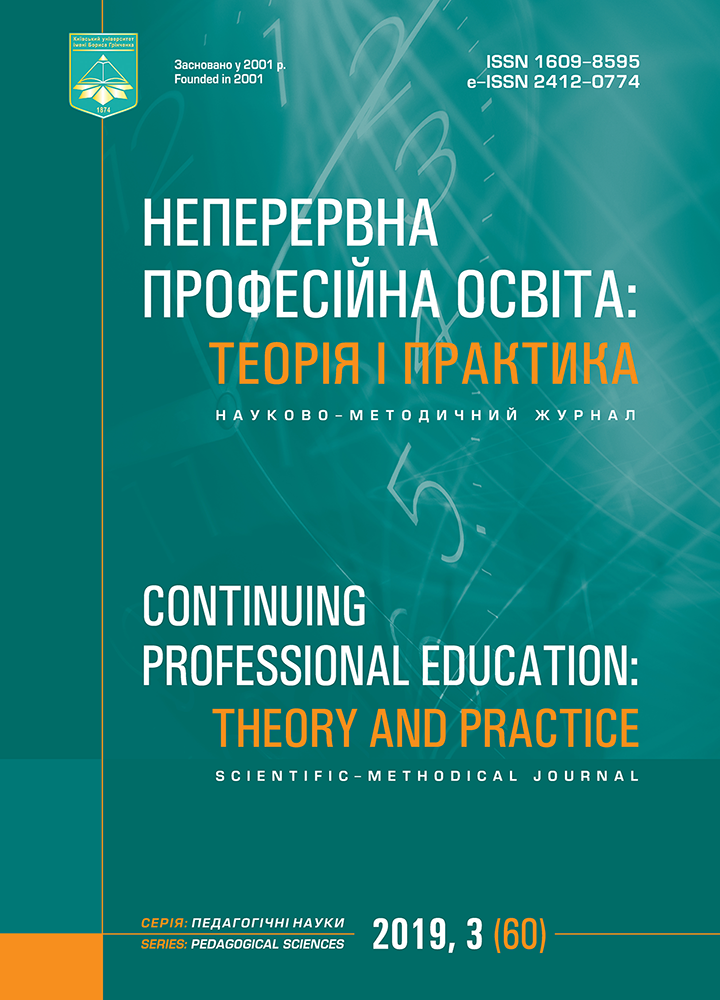TRANSFORMATION OF THE ROLES OF UKRAINIAN UNIVERSITIES TEACHERS IN STUDENT-CENTRED LEARNING AND TEACHING
DOI:
https://doi.org/10.28925/1609-8595.2019.3.3844Keywords:
academic staff, facilitator, learning, student-centred approach, teacher, teaching.Abstract
The article deals with the problem of the readiness of Ukrainian academic staff to transform the role of teacher in student centred learning and teaching. Our research was aimed at studying the readiness of Ukrainian teachers to transform the role of teacher in student-centered learning and teaching. Despite the fact that student-centred approach is confirmed both in normative educational documents and in the theory and practice of European higher education, the teachers of Ukrainian universities are not well-informed about the transformation of the teacher's role in student-centred learning. And, consequently, the change of the authoritarian role of the teacher to the delicate support of the individual educational search of each student goes hand in hand with some difficulties. The empirical material of the research was collected by the method of questioning of academic staff from Ukrainian universities and students of the Central Institute of Postgraduate Pedagogical Education of the National Academy of Sciences of Ukraine. The results of the study confirmed our hypothesis: Ukrainian university lecturers in the majority of cases are not ready to use flexibly different strategies for interaction with students in order to activate, stimulate and encourage the active educational activities of each student in student-centred learning and teaching.
References
Bayram-Jacobs, D. & Hayırsever, F. (2016). Student-centred learning: how does it work in practice? British Journal of Education, Society & Behavioural Science, 18 (3), 1–15. DOI: 10.9734/BJESBS/2016/28810 (eng).
Farrington, I. (1991). Student-centred learning: Rhetoric and reality? Journal of Further and Higher Education, 15 (3), 16–21. DOI: 10.1080/0309877910150302 (eng).
Fewer, J. et al. (2011). Student-Centred Learning Advisory Committee Report. St. John’s, Canada: Memorial University of Newfoundland (eng).
Goodyear, V. & Dudley, D. (2015). «I’m a facilitator of learning!» Understanding what teachers and students do within student-centered physical education models. Quest, 67 (3), 274–289. DOI: 10.1080/00336297.2015.1051236 (eng).
Leuven_Louvain-la-Neuve_Communique (2009). Retrieved from http://media.ehea.info/file/2009_Leuven_Louvain-laNeuve/06/1/Leuven_Louvainla-Neuve_Communique_April_2009_595061.pdf (eng).
Marinko, I. et al. (2015). Empowering teachers for a student-centred approach. Retrieved from http://wsh.pl/wp-content/uploads/2015/05/empowering-teachers-for-a-student-centred-approach.pdf (eng).
Morrison, C. D. (2014). From «sage on the stage» to «guide on the side»: A good start. International Journal for Scholarship of Teaching and Learning, 8 (1), 1–15. DOI: https://doi.org/10.20429/ijsotl.2014.080104 (eng).
Ogienko, O. (2016). Facilitation in the context of pedagogical activities. Advanced Education, 5, 85–89. DOI: 10.20535/2410-8286.70621 (eng).
O’Neil, G., & McMahon, T. (2005). Student-centred learning: What does it mean for students and lecturers? In G. O’Neil, S. Moore, B. McMullin ( Eds.), Emerging Issues in the Practice of University Learning and Teaching (pp. 27–36). Dublin, Ireland: AISHE (eng).
Paris Communiqué (2018). Retrieved from https://mon.gov.ua/storage/app/media/news/%D0%9D%D0%BE%D0% B2%D0%B8%D0%BD%D0%B8/2018/06/06/12/paris-communiqueenua2018.pdf (eng).
Trends 2015: learning and teaching in European universities (2015). Brussels: EUA publication (eng).
Wise, D. (2017). Teaching or facilitating learning? Selecting the optimal approach for your educational objectives and audience. Journal of Extension, 55 (3). Retrieved from https://www.joe.org/joe/2017june/tt1.php (eng).
Gibadullina, Yu. M. (2016). Razvitie rolevoj pozicii budushego pedagoga v obrazovatelnom processe vuza [Development of role position of a future pedagogue in the educational process of the university]. Extended abstract of candidate’s thesis: 13.00.08. Оmsk, Russia (rus).
Halitsan, O. A. (2009). Sutnist i struktura pedagogichnoyi fasilitaciyi vchitelya [The essence and structure of pedagogical facilitation of the teacher]. Narodna osvita, 3 (9) (ukr).
Halytska, M., & Rekun, N. (2018). Polivariantnist rolej vikladacha inozemnoyi movi dlya profesijnih tsilej [Polyvariance of the teaching roles within the ESP course]. The pedagogical process: theory and practice, 4 (63), 57–63. DOI: https://doi.org/10.28925/2078-1687.2018.4.5763 (ukr).
Kolomiichenko, S. Y. (2010). Pidgotovka majbutnogo vchitelya u vishih pedagogichnih navchalnih zakladah do organizaciyi fasilitacijnogo spilkuvannya z uchnyami [Training of future teacher in the institutions of higher education for organizing facilitating communication with students]. Extended abstract of candidate’s thesis: 13.00.04. Kharkiv, Ukraine (ukr).
Standarty i rekomendatsii shchodo zabezpechennia yakosti v Yevropeiskomu prostori vyshchoi osvity [Standards and Guidelines for Quality Assurance in the European Higher Education Area] (2015). Retrieved from https://ihed.org. ua/images/pdf/standards-and-guidelines_for_qa_in_the_ehea_2015.pdf (ukr).
Shevchenko, K. O. (2014). Pedagogichna fasilitaciya u konteksti profesijnoyi kompetentnosti vchitelya [Pedagogical facilitation in the context of teacher’s professional competence]. Naukovyj visnyk Mykolajivsjkogho nacionaljnogho universytetu imeni V. O. Sukhomlynsjkogho. Serija: Psykhologhichni nauky, 2.13, 258–263 (ukr).
Downloads
How to Cite
Issue
Section
License
Copyright (c) 2020 Oksana Bulvinska, Lesya Chervona

This work is licensed under a Creative Commons Attribution-NonCommercial 3.0 Unported License.



